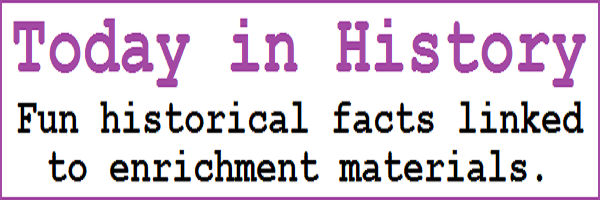| Today in History |
| www.studenthandouts.com > Calendars and Planners > Today in History |
|---|
| Each monthly page lists important historical events which occurred on each day of the month. Also included are links to enriching educational information and teaching materials related to these important days in history. |
|
Reflecting on what happened today in history can be a valuable educational activity for students for several reasons.
Contextual Learning: It allows students to connect historical events to specific dates, helping them understand the chronology of history. This context aids in retaining and comprehending historical information.  Relevance: Learning about historical events that happened on a specific date can make history more relevant to students' lives. They can see how past events have shaped the world they live in today.
Relevance: Learning about historical events that happened on a specific date can make history more relevant to students' lives. They can see how past events have shaped the world they live in today.
Critical Thinking: Reflecting on historical events encourages critical thinking and analysis. Students can explore the causes, consequences, and significance of these events, developing their analytical skills. Empathy and Perspective-Taking: Reflecting on historical events can foster empathy as students consider the experiences of people living in the past. They gain insight into the challenges, triumphs, and struggles faced by individuals and societies. Connection to Current Events: Examining historical events that happened on a particular date can help students draw connections to contemporary issues and understand how the past continues to influence the present. Research Skills: It encourages research skills as students seek out information about historical events. They may need to access primary and secondary sources, enhancing their research abilities. Discussion and Dialogue: Reflecting on historical events can lead to classroom discussions and dialogue, where students can share their insights, ask questions, and engage in meaningful conversations about history. Cultural Awareness: It promotes cultural awareness by exploring events from different time periods and regions. This can broaden students' understanding of diverse cultures and societies. Memory and Retention: Associating historical events with specific dates can aid memory and retention. It provides mnemonic devices that help students remember important historical facts. Informed Citizenship: Understanding history and its impact on society is essential for informed citizenship. Reflecting on historical events can help students become engaged and responsible citizens who make informed decisions. Interdisciplinary Learning: Reflecting on historical events can integrate various academic disciplines, including history, geography, politics, economics, and more. This interdisciplinary approach enriches students' understanding of complex issues. Teaching Critical Themes: Educators can use historical events to teach critical themes, such as human rights, social justice, conflict, and change over time. To incorporate daily historical reflections in the classroom, teachers can:
|
| www.studenthandouts.com > Calendars and Planners > Today in History |
|---|






